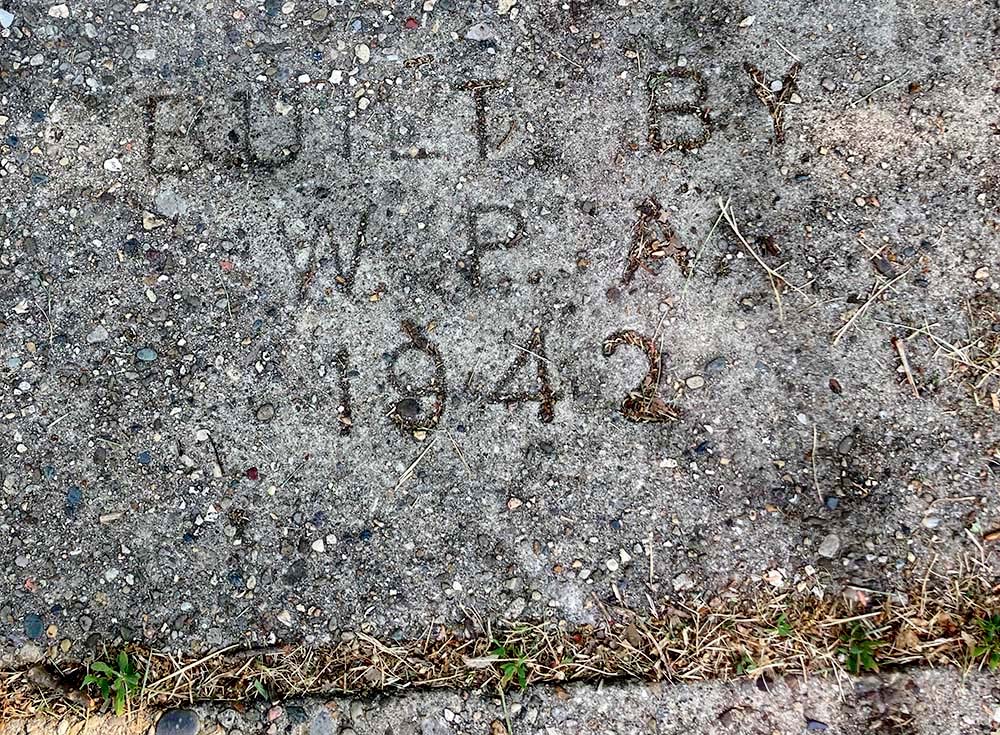
A stamp on the sidewalk near Sr. Emily TeKolste's neighborhood in Terre Haute, Indiana, reads "Built by W.P.A. 1942." (Courtesy of Emily TeKolste)
Just over six months ago, I moved into a new house in Terre Haute, Indiana, near my community's motherhouse. Terre Haute is a small post-industrial city on the western edge of the state. Our neighborhood is a historic district, a mix of still-stately old homes and rundown buildings that harbor echoes of their former grandiosity. Some of the houses are vacant, while others are rented out by slumlords to local people living in poverty. I can see all of this diversity from my home office window.
The other day, as I was walking through the neighborhood, I looked down to see a stamp on the sidewalk that read "Built by W.P.A. 1942." Eighty years old, and the sidewalk originally built by a massive federal spending program meant to pull us out of the Great Depression is still giving life to my little neighborhood in Terre Haute.
And yet, I daily see the decaying homes in my neighborhood that people just couldn't afford to keep up with, and I wonder what it was like to have once had a truly vibrant middle class in this nation — a middle class protected by labor unions and federal policy that invested in everyone, not just the wealthy.
Of course, that's not the full story. The middle class of the 1950s and 1960s was a white middle class. Labor unions and federal policy intentionally left out people of color. As we as a nation moved toward integration, policy shifted under the weight of dog whistles and divide-and-conquer strategies.
As Heather McGhee describes in The Sum of Us: What Racism Costs Everyone and How We Can Prosper Together, policy shifted as people decided that they would give up access to public goods rather than allow people different from them also to have access.
Advertisement
We slashed public funding for public universities, and now we have a student debt crisis of epic proportions. We closed public swimming pools. We slashed worker protections and tax rates for the white people who had generational wealth to spare. And we've all suffered because of it.
McGhee asserts that we have to address and overcome racism in order to overcome economic inequality — because racism is what divides us against each other.
Over the weekend, my housemate and I went next door to talk to some of our neighbors to ask them to pick up their dog's poop from our yard. It surprised me how much they were touched that we came to talk to them, that we remembered the name of the husband that we'd met before.
In the conversation that flowed out of our initial request, we talked about their lives living in poverty, their dreams and their struggles. In this simple interaction, I saw the fullness of their humanity.
I saw the divine Creator shining in their images as they talked about their dreams: He's a writer. She dreams of opening a shelter for boys and young men who have experienced abuse, since most shelters are targeted for girls and young women.
What could our society look like if they had access to enough resources to put food on the table, live in stable and decent housing, and have the security to work toward their dreams? What kind of good could they do in the world if they weren't daily trying to survive the trauma of poverty?
The truth is that there is enough to go around. There is more than enough. The owners and CEOs didn't generate the profit. They just wielded their power to put it in their pockets.
I dream of a New New Deal — a massive visionary action of government to build our cities and towns into the thriving communities that we know they can be. A society that works for all of us — no matter what we look like or the zip code of our neighborhood.




